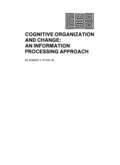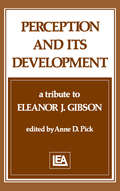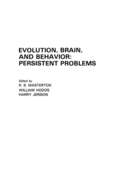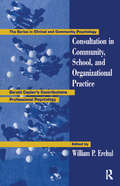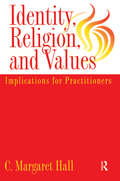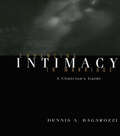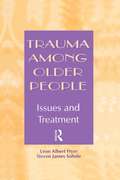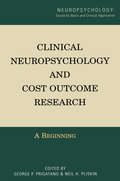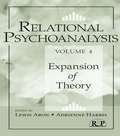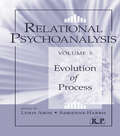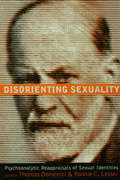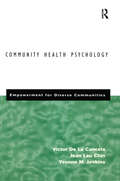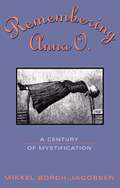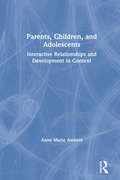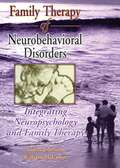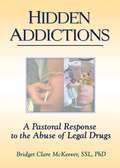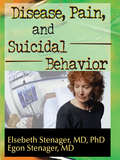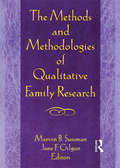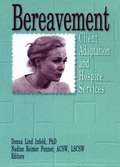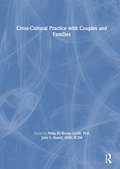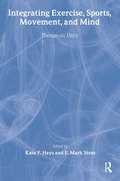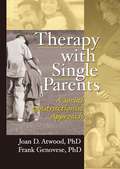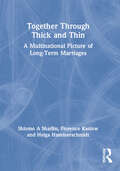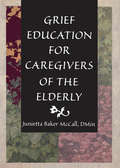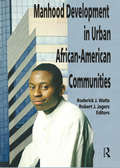- Table View
- List View
Cognitive Organization and Change: An Information-processing Approach (Complex Human Behavior Ser.)
by R. S. Wyer, Jr.This book grew out of a graduate course in cognitive organization and change that the author taught during his tenure at the University of Illinois at Chicago Circle. Two primary objectives of the course are reflected in this book: first, to provide a general conceptual framework for critically and systematically analyzing research and theory on attitude and opinion change; second, to stimulate research on fundamental problems, related to these phenomena, that are made salient as a result of this analysis. First published in 1974. Routledge is an imprint of Taylor & Francis, an informa company.
Perception and Its Development: A Tribute To Eleanor J. Gibson
by Anne D. PickWe have acquired important new knowledge about the nature and development of perception in recent years, and the insights of Eleanor Jack Gibson have had a prominent role in guiding the search for that knowledge. The purpose of this volume is to honor her continuing conrbution to our understanding of perception. First published in 1979. Routledge is an imprint of Taylor & Francis, an informa company.
Evolution, Brain, and Behavior: Persistent Problems
by R. B. MASTERTON, WILLIAM HODOS AND HARRY JERISONIn this second volume on the evolution of the nervous system and behavior, the discussion turns from conclusions to method, from a desciption of what happened in history to the means of deciidng what happened. First published in 1976.
Consultation In Community, School, And Organizational Practice: Gerald Caplan's Contributions To Professional Psychology (Clinical and Community Psychology)
by William P. ErchulOffering an historical perspective on the development of mental health consultation and community mental health, this book's intent is twofold. First, it describes and evaluates Harvard psychiatrist Gerald Caplan's innovative approach to consultation and related activities with respect to the current and future practice of clinical community, school and organizational psychology. Second, it pays tribute to Caplan whose ideas on prevention, crisis theory, support systems, community mental health, mental health consultation and collaboration and population-orientated psychiatry have influenced the practice of professional psychology and allied fields.; The text is divided into three sections: the first provides background information for the remainder of the volume; the second documents Caplan's influence on the way psychology has been applied in various settings; andthe last considers his contribution's present and past influence. The text is aimed at consultant and practising psychologists, community and school psychology graduates and professionals involved with community mental health services.
Identity Religion And Values: Implications for Practitioners
by C. Margaret HallDesigned for professionals, this handbook focuses on the impact of patients' religion snd spirituality. It presents the identity empowerment theory, a clinical sociological theory, and includes case studies and intervention strategies.
Enhancing Intimacy in Marriage: A Clinician's Guide
by Dennis A. BagarozziMost people believe that intimacy is a unitary construct-that is, that it is made up of only one component. Dr. Bagarozzi demonstrates how intimacy is comprised of at least nine separate subcomponents. The degree to which partners can meet the intimacy needs of their mates in all nine areas is critical to marital satisfaction. Building upon the foundations of the author's Enhancing Intimacy Program, which he developed and utilized in his own practice with clients, Enhancing Intimacy in Marriage explores the ways in which intimacy is demonstrated and communicated between married partners. A simple questionnaire, the Intimacy Needs Survey, is used to help couples identify areas of satisfaction and areas where intimacy needs are not being met. Clinical strategies for helping couples improve their intimacy are presented in case examples. This book is unique in that it offers clinicians a step-by-step approach for both assessment and intervention
Trauma Among Older People: Issues and Treatment
by Leon Albert Hyer Steven SohnleTrauma Among Older Adults presents an integrative model of treatment that considers current theories of treatment in light of special considerations relating to elderly patients. The book provides case studies, vignettes, and discussions, and demonstrates the importance of considering the personality, memory, and familial history of an elderly individual who has suffered a trauma.
Clinical Neuropsychology and Cost Outcome Research: A Beginning
by George P. Prigatano Neil H. PliskinNeuropsychologists are being increasingly called upon to demonstrate the value of their services. This edited book introduces clinical neuropsychologists to the concepts and challenges involved in conducting cost outcome research. It provides examples of how such research can be conducted within clinical neuropsychology and therefore is a "beginning" step in what must become an interdisciplinary effort. The text suggests that more than cost effectiveness studies should be considered when demonstrating the clinical utility of neuropsychological services. The concept of "objective" and "subjective" markers of value is emphasized, particularly as it relates to measuring the impact of a neuropsychological examination. Chapters review the economic burdens associated with different neurological conditions commonly seen by neuropsychologists. They also provide examples of how clinical neuropsychological services to different patient populations may reduce "costs" and increase "benefits" and suggest directions for beginning cost outcome research. Furthermore, the book summarizes the utility of various neuropsychological services that may be helpful to readers concerned with healthcare economies. The book is intended as a resource for clinical neuropsychologists who wish to explain to healthcare providers the value of their work. It is the first book of the National Academy of Neuropsychology book series entitled: Neuropsychology: Scientific Bases and Clinical Application.
Relational Psychoanalysis, Volume 4: Expansion of Theory (Relational Perspectives Book Series #14)
by Adrienne Harris Lewis AronBuilding on the success and importance of three previous volumes, Relational Psychoanalysis continues to expand and develop the relational turn. Under the keen editorship of Lewis Aron and Adrienne Harris, and comprised of the contributions of many of the leading voices in the relational world, Volume 4 carries on the legacy of this rich and diversified psychoanalytic approach by taking a fresh look at recent developments in relational theory. Included here are chapters on sexuality and gender, race and class, identity and self, thirdness, the transitional subject, the body, and more. Thoughtful, capacious, and integrative, this new volume places the leading edge of relational thought close at hand, and pushes the boundaries of the relational turn that much closer to the horizon. Contributors: Neil Altman, Jessica Benjamin, Emanuel Berman, Jeanne Wolff Bernstein, Susan Coates, Ken Corbett, Muriel Dimen, Martin Stephen Frommer, Jill Gentile, Samuel Gerson, Virginia Goldner, Sue Grand, Hazel Ipp, Kimberlyn Leary, Jonathan Slavin, Malcolm Owen Slavin, Charles Spezzano, Ruth Stein, Melanie Suchet.
Relational Psychoanalysis, Volume 5: Evolution of Process (Relational Perspectives Book Series #14)
by Adrienne Harris Lewis AronBuilding on the success and importance of three previous volumes, Relational Psychoanalysis continues to expand and develop the relational turn. Under the keen editorship of Lewis Aron and Adrienne Harris, and comprised of the contributions of many of the leading voices in the relational world, Volume 5 carries on the legacy of this rich and diversified psychoanalytic approach by taking a fresh look at the progress in therapeutic process. Included here are chapters on transference and countertransference, engagement, dissociation and self-states, analytic impasses, privacy and disclosure, enactments, improvisation, development, and more. Thoughtful, capacious, and integrative, this new volume places the leading edge of relational thought close at hand, and pushes the boundaries of the relational turn that much closer to the horizon. Contributors: Lewis Aron, Anthony Bass, Beatrice Beebe, Philip Bromberg, Steven Cooper, Jody Messler Davies, Darlene Ehrenberg, Dianne Elise, Glen Gabbard, Adrienne Harris, Irwin Hoffman, Steven Knoblauch, Thomas Ogden, Spyros Orfanos, Stuart Pizer, Philip Ringstrom, Jill Salberg, Stephen Seligman, Joyce Slochower, Donnel Stern, Paul Wachtel.
Disorienting Sexuality: Psychoanalytic Reappraisals of Sexual Identities
by Ronnie C. Lesser Thomas DomeniciDisorienting Sexuality exposes the biases against gay men and lesbians in psychoanalytic theory and practice. In the introduction, Domenici and Lesser draw a brief history of anti-homosexual sentiment in psychoanalysis. The book then moves into essays written by lesbian and gay psychoanalysts seeking to have a voice in the reshaping of psychoanalytic theories of sexuality. The second section is devoted to presenting different theoretical perspectives for understanding both homosexuality and heterosexuality. Disorienting Sexuality concludes with the personal narratives of gay and lesbian psychoanalysts.
Community Health Psychology: Empowerment for Diverse Communities
by Jean Lau Chin Victor De La Cancela Yvonne JenkinsAs the number of people of color rapidly grows within the US population, health providers in these communities have become increasingly aware of the need to address the concerns and problems particular to each group. It's also become clear that as the delivery of our health care systems evolve, a new approach must be summoned to build systems both cost-effective and socially responsible.Community Health Psychology offers a new and different perspective for redressing the gaps in our systems of care. The authors contend that in order to begin an attempt at eradicating the more intractable societal problems, health providers need to tailor themselves to a more culturally competent approach, which addresses all members of a community they claim to serve.
Remembering Anna O.: A Century of Mystification
by Mikkel Borch-JacobsenRemembering Anna O. offers a devastating examination of the very foundations of psychoanalytic theory and practice, which was born with the publication of Breuer and Freud's Studies on Hysteria in 1895. Breuer described the case of Anna O., a young woman afflicted with a severe hysteria whom he had cured of her symptoms by having her recount under hypnosis the traumatic events that precipitated her illness. Drawing on the most recent Freud scholarship and on long-secret documents, Borch-Jacobsen demonstrates, however, that Anna O. (Bertha Pappenheim) was never cured by Breuer's "talking cure" and that both Breuer and Freud knowingly falsified the historical record. Borch-Jacobsen points out the numerous inconsistencies in Breuer's account that suggests that Anna O.'s symptoms were simulated to meet Breuer's theoretical expectations and that her famed "reminiscences" were in fact fictitious memories induced by Breuer in the course of a hypnotic treatment.
Parents, Children, and Adolescents: Interactive Relationships and Development in Context
by Anne Marie AmbertParents, Children, and Adolescents presents an integrative perspective of the parent-child relationship within several contexts. You can expand your empirical and theoretical knowledge of the parent-child relationship and child development through the book’s unusually holistic, theoretical perspective that integrates three main frameworks: interactional theories on parents, children, and development; contextual (ecological) models; and behavior genetics.This insightful book’s empirical scope is broader than that of most books in that it considers the parent-child relationship throughout the life course as well as within a great variety of contexts, including interactions with sibling and peers, at school, in their neighborhoods, and with professionals. You’ll gain immeasurable knowledge about: parents’child-rearing styles and how they are affected by environmental variables the interaction between parents and children, and between their personalities behavior genetics as one of the explanatory frameworks for the role of genetics and environment negative child outcomes--emotional problems, conduct disorders, and delinquency poverty and other stressors affecting parents and children problematic-abusive, emotionally disturbed, alcoholic parents siblings and peers as contexts for the parent-child dyad the effect of the school system on the family, with a focus on minority families family structure--divorce, remarriage, and families headed by never-married mothers adolescent mothers and their own mothers the psychogenetic limitations on parental influence and cultural roadblocks to parental moral authorityComplete with an Instructor’s Manual, Parents, Children, and Adolescents is ideal for advanced undergraduate and graduate classes in family studies and human development, sociology of the family, interdisciplinary developmental psychology, and social work classes that need a thorough perspective on the parent-child relationship. Professionals and scholars in these fields seeking an interdisciplinary framework as well as research suggestions and incisive critiques of traditional perspectives will also find this innovative book a valuable addition to their reading lists.
Family Therapy of Neurobehavioral Disorders: Integrating Neuropsychology and Family Therapy
by William G. McCown Judith L JohnsonFamily Therapy of Neurobehavioral Disorders shows you a unique integration of neuropsychology and family therapy. Authors Judith L. Johnson and William G. McCown span these two broad areas by synthesizing family therapy principles and applying them specifically to traumatic brain injury and degenerative dementia. Family therapists, neuropsychologists, social workers, and counselors working with patients who experience brain dysfunction and their families learn to better address common issues and problems and of therapeutic interventions. This expert book includes case examples and working models of family reactions. The book then extends this information into practical clinical situations commonly confronted in work with these patients and their families. Readers of Family Therapy of Neurobehavioral Disorders are introduced to brain-behavior relationships including neuroanatomy of the brain as it relates to behavior, dynamics of neurologic disorders, and common symptoms of brain dysfunction. You can then use this information to help persons with traumatic brain injury and their families cope with and adjust to the issues and challenges they face. Specifically, you gain invaluable, informative insight into: the neuroanatomy of the brain and which structures mediate behavior, emotion, and cognition common issues families face when a member suffers traumatic brain injury therapeutic strategies and practical suggestions for assisting families mild head injury and familial reactions common issues faced by families confronting Alzheimer’s disease or other dementias a model of family reactions to dementia over timeChapters in Family Therapy of Neurobehavioral Disorders outline symptoms of brain dysfunction and family therapy designed to approach these symptoms. Divided into two sections, the book gives readers a model of traumatic brain injury beginning with the initial onset and proceeding through time. This section focuses on changes within the family and therapeutic strategies for helping these distressed families. Secondly, the authors address degenerative dementia with emphases on certain phases through which family members may progress as they acknowledge their loved one’s condition and then therapeutically work through the reality of it. Professionals in the medical and social sciences will find Family Therapy of Neurobehavioral Disorders a unique and irreplacable guide for developing and understanding the meshing of neuropsychology and family therapy. Also, the book serves as a solid text for students in courses such as rehabilitation, counseling, and family therapy.Translated into Spanish!
Hidden Addictions: A Pastoral Response to the Abuse of Legal Drugs
by Richard L Dayringer Bridget C Mc KeeverIn Hidden Addictions: A Pastoral Response to the Abuse of Legal Drugs, you’ll find that beneath the gruesome, more public face of illegal drug abuse lies another less hideous, but just as destructive, layer of addiction--the addiction to prescribed drugs. In this revealing study, you’ll learn how you can confront the hidden malady of legal drug dependency in individuals and ultimately break its chokehold on a world already ravaged by complacency and social-systemic dysfunction.The only book of its kind, Hidden Addictions is a concise, readable pastoral perspective on the creeping epidemic of legal drug abuse. Its illuminating case vignettes show you the social roots of addiction and give you the spiritual and religious resources necessary to put you and your loved ones on the road to holistic recovery. Specifically, you’ll read about: groups most at risk--girls, young women, and older women types of drugs, including tranquilizers, sedatives, antidepressants, and painkillers over-the-counter drugs and look-alike drugs women and the pharmaceutical industry recovery methods, including detoxification, family therapy, and couple counseling spiritual resources and systemic reformIn a society already addicted to power, pleasure, and possession, you don’t always see the “warning buttons” being pushed. But this book shows that you can turn back the quiet tide of spiritual sickness and psychochemical dependency that’s sweeping the globe. So whether you’re a pastor whose congregation is suffering, a social worker administering to addicted clientele, or a campus minister, Hidden Addictions will give you the pragmatism and awareness you need to heal the wounded soul.
Disease, Pain, and Suicidal Behavior
by Elsebeth StenagerEstimating the risk for suicidal behavior among patients is often a very complex challenge for psychiatrists, general practitioners, psychologists, surgeons, specialists in internal medicine, neurologists, nurses, and social workers. Disease, Pain, and Suicidal Behavior is designed to help you understand the methodological problems involved in the assessment of risk for suicidal behavior in patients with various somatic and psychiatric disorders so you can establish effective approaches to the psychosocial treatment of endangered patients. Through the book’s comprehensive and insightful discussions, you will even learn specific strategies for improving the quality of life of such patients.Disease, Pain, and Suicidal Behavior discusses psychiatric disorders such as depression, schizophrenia, personality disorders, anxiety disorders, and alcohol and drug abuse as risk factors for suicidal behavior. From its helpful and clearly written pages, you will also learn about the role of social factors in suicidal behavior and the relationship between suicidal behavior and biological factors. Perhaps most important of all, you will learn which groups of patients and which disorders are associated with the highest risk of suicide through the book’s critical discussions of: the lifetime risk of suicide in depressed patients the stages of diseases like multiple sclerosis and the strains placed on the patient young male schizophrenics and their vulnerability to self-destructive acts mortality in patients with spinal cord injuries forced reduction in daily activities for patients with heart and lung conditions and resulting emotional instability the high risk of suicide immediately after a cancer diagnosis is given identifying risk factors for a second attempt at suicide questions to ask those at risk for suicidal behaviorRecognizing which of your patients run the risk of committing suicide can be an overwhelming task because of the multiplicity of factors involved. Disease, Pain, and Suicidal Behavior, because it examines critically the existing literature and studies on suicide and suicide risk, can help you evaluate and prevent suicidal behavior in a timely manner. You will turn the last of its pages with a much improved understanding of which illnesses and sufferings present an increased risk of suicidal behavior.
The Methods and Methodologies of Qualitative Family Research
by Marvin B Sussman Janet F GilgunThe Methods and Methodologies of Qualitative Family Research can provide you with a strong conceptual framework for undertaking qualitative research. As it explores inquiry and theory on the cutting edge, it shows how qualitative methodologies can be applied to family life, education, and research. Designed to demonstrate how emerging and established methodologies can advance the understanding of families and direct social change, this book is a major step in assessing the development, progress, and contributions of qualitative inquiry. Packed with useful information and innovative approaches, this volume pulls together a rich and diverse group of essays that teach readers about the complexities and challenges of qualitative research. Most importantly, you’ll learn how new qualitative approaches are grounded in systems thinking, holistic formulations, attention to context, cultural sensitivity, and nonlinear dynamics.The Methods and Methodologies of Qualitative Family Research is distinct from other books of its kind because it acknowledges the agent, or self, in compiling data and reaching conclusions. Moreover, it analyzes how studying the world affects those doing the studying and how those effects, in turn, play a substantial role in interpreting data and forming conclusions. The Methods and Methodologies of Qualitative Family Research introduces three major types of qualitative clinical family research: conversational analysis, recursive frame analysis, and hermeneutic phenomenology. It exposes a wide array of resources for undertaking qualitative inquiry, including data journals, letters, official files, clinical case notes, folk tales, interviews, and field observations. You’ll learn how these resources are invaluable tools for understanding: couples’decisionmaking generative fathering reflexivity the use of historical data to construct composite cases egalitarianism and oppression in marriage perceptions of gender, race, and class among African-American adolescent women successful aging among individuals who require long-term care poverty and access to servicesA skillful blend of theory and practice, The Methods and Methodologies of Qualitative Family Research offers conceptual schemes, bibliographies, and other useful resources for teaching and conducting qualitative research. It will revolutionize the way you think about qualitative inquiry and your own approaches to qualitative family research. In addition, you’ll come away updated on the current state of qualitative research and with new skills and techniques for tackling your own research.
Bereavement: Client Adaptation and Hospice Services
by Donna Infeld Nadine R PennerHelping a mother transcend the death of her only child, helping a young child understand and cope with the death of a loved one, and helping survivors of the AIDS epidemic cope with the loss of numerous loved ones and the loss of community are among the greatest challenges facing today&’s bereavement counselors. Bereavement explores these sensitive issues and ways bereavement counselors can help these individuals construct new identities and new worldviews that are self-affirming. Using this book as a guide, you can improve your understanding of the various resources and options that can be employed to achieve the healthy resolution of grief with individuals, families, and communities. Recognizing that the experience of grieving is unique for all individuals, Bereavement addresses a wide range of issues facing bereavement professionals. Its authors offer a multitude of effective therapeutic interventions and techniques. You will learn to encourage grievers to incorporate important aspects of their lost relationship(s) into their present lives to gain greater personal integration and wholeness; see how to use music, dance, art, and play therapy with clients to help them explore their grief and move through the various stages of grieving; acquire helpful hints and practical advice for offering extended bereavement care to both hospice and non-hospice families; and see how a highly successful interdisciplinary bereavement team approach has been employed in one of the largest bereavement programs in the U.S. You will also learn about other crucial topics and issues faced by bereavement counselors, including: uniting survivors of different types of death in a support group teaching your community about death/dying developing rural hospice bereavement services emotional, behavioral, physical, social, and cognitive symptoms of grief healthy coping mechanisms pre-death bereavement interventions Post-Traumatic Stress Disorder multiple trauma survivor guilt bereavement counseling as a supplement to normal support networksBereavement will help you enhance your knowledge and skills in the delivery of effective bereavement services. Whether you are a beginner or a counselor with several years of experience, you will find this book an invaluable guide as it walks you through the different stages of mourning, through different human reactions to death and dying, and through different therapeutic approaches.
Cross-Cultural Practice with Couples and Families
by John S Shalett Philip M BrownCross-Cultural Practice with Couples and Families prepares you for the ways that cultural realities can affect your social work practice with both couples and families. You will gain in-depth exposure to a variety of cultural values and perspectives and learn to identify similarities and differences between and among different ethnic families. This will lead you to a deeper, more thorough understanding of the roles, dynamics, and particular challenges of social work, both current and historical.From Cross-Cultural Practice with Couples and Families, you will learn how to use the religious history, family values, rituals, and community in attaining positive outcomes in treatment. Placing value on diversity in families, supporting ethnic differences, and recognizing the strength and resiliency of modern-day families will become the cornerstones of your more effective and sensitive social work practice. The authors, who come with firsthand experience, provide you with specific models and approaches for working with families and couples of different backgrounds. They also offer you insight on: treatment implications for interracial couples the components of healthy marriages domestic violence from various cultural perspectives the Native American family circle cross-cultural considerations in family preservation the realities of racism in the worker-client relationshipCross-Cultural Practice with Couples and Families is an excellent resource for graduate students, faculty, and practitioners alike! When ideas and interventions become more complex, the authors guide you through them step-by-step to make implementation easy and practical. Nowhere else will you find such a reader-friendly form that makes the role of culture in therapy and its influence on structure, communication, dynamics, process, and interventions within couple and family systems so astonishingly clear!
Integrating Exercise, Sports, Movement, and Mind: Therapeutic Unity
by Kate F HaysRead Integrating Exercise, Sports, Movement, and Mind: Therapeutic Unity, and you’ll see how exercise and movement are actually the keys to achieving a harmonious equilibrium between thoughts and physical health. This unique collection of writing, a healthy and diverse montage in its own right, mirrors its topic, helping you see how a variegated array of body movements can lead to a healthier, happier mind.A kaleidoscope of theory and application, case study and abstraction, Integrating Exercise, Sports, Movement, and Mind spans the spectrum of relevant issues, including those revolving around gender, class, ethnicity, and family systems, and accomplishes its task through the medium of a wide assortment of activities, including gymnastics, soccer, horseback riding, archery, running, walking, and cycling. Your perspective on body movement and body-mind unity will be deepened as you read about these topics: family system perspectives and youth sports rehabilitation--“patient as athlete” contact Improvisation the concept of “flow” from within a gendered consciousness sport psychology and the coach/athlete/consultant triad clinical sport psychology sport trauma recoveryIt’s a unique but universal relationship--this prism of thoughts and physical locomotion. So open up Integrating Exercise, Sports, Movement, and Mind and let some of the top experts in the field of sport psychology open your mind and show you how to unlock the body’s potential on the athletic field.
Therapy with Single Parents: A Social Constructionist Approach
by Joan D Atwood Frank GenoveseProvide effective counseling to members of single-parent familiesWith more than half of all first marriages ending in divorce, it&’s time to re-think the notion that "divorce" means "failure." Therapy with Single Parents focuses on the strengths of the single-parent family rather than its weaknesses, stressing the need to look at the socially constructed norms, values, and definitions associated with marriage and family in order to provide effective counseling. This unique book examines experiences that are common to single parents and presents interventive strategies for treating single-parent family issues, drawing on clinical case studies to provide technical knowledge in everyday language.Current research shows that single parents account for 27 percent of family households that include children under 18 and that the number of single mothers in the United States more than tripled between 1970 and 2000. Therapy with Single Parents challenges outdated notions that the single-parent family is somehow deficient and associated with adjustment problems in children. It doesn&’t ignore the anger, pain, sadness, and guilt experienced by many members of single parent families but offers therapeutic considerations from a more balanced approach. The book examines the social, psychological, and sexual experiences of newly single parents and addresses the ups and downs they&’ll face in dealing with schools, the workplace, and social services. Therapy with Single Parents examines: social and psychological differences between divorce and widowhood cognitive-behavioral principles of single-parent families what children can learn from divorce dealing with the ghosts of past relationships relationship rules dealing with adult children and extended families the effect of change in divorcing families the feminization of poverty the therapeutic value of social networksTherapy with Single Parents is an invaluable resource for psychologists, professional counselors, social workers, and marriage and family therapists. The book presents a thorough, in-depth examination of the single-parent family system as a viable, healthy family form.
Together Through Thick and Thin: A Multinational Picture of Long-Term Marriages
by Florence Kaslow Shlomo A SharlinDiscover what factors, beliefs, and attitudes build a successful marriage!In the enormous social, political, and technological upheavals since World War I, the long and happy marriage has begun to seem like an endangered species. In the desperate hunt for reasons that marriages fail, most researchers have ignored the factors that help marriages succeed. Together Through Thick and Thin: A Multinational Picture of Long-Term Marriage reports a landmark study of long-term satisfaction in marriage. Instead of relying on conjecture or unproven clinical hunches, the authors studied the happily married around the world. The respondents’early experiences included the Great Depression, World War II, and the Holocaust as well as the Roaring Twenties. In the years since they married, technological change and the women's movement have made the world almost unrecognizable. Yet these people have managed to maintain both stability and quality in their marriages. The scope of Together Through Thick and Thin is sweeping: eight countries, more than 400 couples who had been happily married for between 25 and 45 years. Factors analyzed include degree of satisfaction, gender differences, socioeconomic level, family history, shared values, religious belief and practice, attitudes toward children, physical health, and problem-solving styles, among many others. Moreover, the book builds on existing documented literature on marriage. This solid background helps put its wealth of practical data into context, an ideal synthesis of theory and practice.This study delves into the reasons couples stay together and stay satisfied. What qualities and attitudes do happily married couples share? Can the factors that keep a Chilean couple together for life also apply in the very different cultures of Sweden, Israel, South Africa, the United States? What keeps a marriage together in times of crisis? How important is love?Together Through Thick and Thin helps you understand the diverse factors that affect marital quality and stability by offering a broad range of information:a comprehensive review of the literature of happy marriage cross-cultural comparisons that kindle fresh insights discussions of factors ranging from gender and economic status to family history and shared attitudes specific behaviors and attitudes that illuminate what matters most in marriage, from mutual respect to shared fun the reasons couples stick together during crises which problem-solving behaviors actually workTogether Through Thick and Thin provides psychologists, family therapists, and couples counselors with the solid data they need to guide couples in crisis toward greater intimacy, commitment, and joy together.
Grief Education for Caregivers of the Elderly
by Harold G Koenig Junietta B MccallThrough firsthand accounts and research, Grief Education for Caregivers of the Elderly focuses on the education, training, and support of individuals who care for the elderly. This book provides caregivers with methods to cope with grief and loss and will help educators design programs that meet the needs of their consumers: the elderly and their families, friends, and service providers. From Grief Education for Caregivers of the Elderly, you'll learn how to cope with the stress and emotions of caregiving and improve the quality of services to your patients. With an emphasis on caregivers of the institutionalized elderly and the special services provided by clergy, chaplains, and pastoral counselors, Grief Education for Caregivers of the Elderly offers the caregiver or educator several model workshops focusing on grief, loss, and bereavement care. Grief Education for Caregivers of the Elderly contains proven methods and strategies that will sharpen and enhance your caregiving skills, including: focusing on the emotional responses and phases of dying, including denial, anger, and acceptance, to help patients deal with death considering physical and administrative atmosphere and your elderly population when setting goals and designing workshops to provide optimal patient/resident care discussing the themes of grief and loss, stress management, handling change, and promoting self-care for caregivers in workshops and through self-evaluations developing workshops that open with grief history surveys and attitude checklists, discuss normative development and issues of old age, and have themes based on the biological, psychosocial, and spiritual needs of the elderly person providing caregivers with an opportunity to practice what they have learned through case studies, simulated role play, open discussions, and care plan designing thinking about your own mortality and learning about your feelings and ideas of growing oldUtilized at a psychiatric nursing home facility of New Hampshire Hospital, the workshop exercises in Grief Education for Caregivers of the Elderly have allowed caregivers to express personal feelings; talk about beliefs and experiences; learn about biological, psychosocial, and spiritual processes of grief and phases of bereavement; and apply these understandings and insights into typical caregiving situations. Grief Education for the Caregivers of the Elderly gives you the framework for such a program, using vignettes, composite case material, poetry, and a holistic approach to health care to emphasize the importance of your emotional health and enhanced care of the elderly.
Manhood Development in Urban African-American Communities
by Robert J Jagers Roderick J WattsOne of the first books to unite practice, research, and theory in addressing manhood development, Manhood Development in Urban African-American Communities aids in the construction of more holistic and progressive notions of African-American manhood. Proceeding from a psychological perspective, this text explores issues of culture and race as they impact on the cognitive, emotional, and behavioral characteristics of African-American boys and men. You will see how the development of self-esteem and self-image in African-American men are specifically affected by issues of gender, race, culture, religion, and oppression. You will see how the development of self-esteem and self-image in African-American men are specifically affected by issues of gender, race, culture, religion. The understanding of culture, oppression, and gender you’ll gain from this book will enable you to promote the positive development of young men.Manhood Development in Urban African-American Communities covers theories, research, and intervention programs aimed at better understanding and addressing the challenges young African-American men face in urban areas. Psychologists, sociologists, social workers, and all others interested in research on youth development will be captivated by the books explorations of: the role of culture in the social development of African-American youth cluster profiles of racial socialization beliefs, giving special consideration to factors of spiritual/religious coping, extended family care, cultural pride reinforcement, and racial awareness oppression and sociopolitical development as a basis for interventions aimed at sociopolitical awareness and action findings from SQAKs (Student Questionnaire on Academic Performance, Cognitive Development, and Social Knowledge) completed by 100 participants of the RAAMUS (Responsible African-American Men United in Spirit) Academy and their implications for future youth interventions a multi-method study that explores the relationship between gender, spirituality, and spiritual well-being and several indices of religiosity, including religious participation and religious motivation a review of manhood and womanhood development in traditional African societies and the connection with contemporary developmentThe themes of gender, oppression-liberation, and culture found throughout Manhood Development in Urban African-American Communities provide a broad scope for the inclusion of a wide range of perspectives and disciplines, ranging from the psychological to the political. This broad perspective will bring to light the specific ways in which we need to change things to allow our young African-American men living in urban areas to form healthy, positive images of themselves as individuals and as part of a greater society in which they often face grave challenges.
